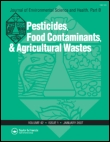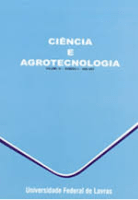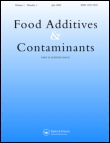
JOURNAL OF ENVIRONMENTAL SCIENCE AND HEALTH PART B-PESTICIDES FOOD CONTAMINANTS AND AGRICULTURAL WASTES
Scope & Guideline
Unraveling the complexities of food contaminants and health.
Introduction
Aims and Scopes
- Pesticide Residue Analysis:
Research focusing on the detection, quantification, and risk assessment of pesticide residues in various environmental matrices, including soil, water, and food products. - Bioremediation and Environmental Recovery:
Studies on the use of microorganisms and plants to remediate contaminated environments, including the degradation of pesticides and heavy metals. - Ecotoxicology and Health Implications:
Investigations into the toxic effects of pesticides and pollutants on human health and the environment, including bioaccumulation studies and health risk assessments. - Innovative Analytical Techniques:
Development and application of advanced analytical methods for the detection and quantification of environmental contaminants, including novel extraction and detection techniques. - Sustainable Agricultural Practices:
Research promoting sustainable agricultural methods and practices that minimize the use of harmful chemicals and enhance environmental health. - Microbial and Plant Interactions:
Studies examining the interactions between plants, microbes, and environmental contaminants, focusing on biocontrol and phytoremediation.
Trending and Emerging
- Microbial Biodegradation:
An increasing interest in the role of microorganisms in degrading environmental pollutants, particularly pesticides, is evident, showcasing innovative bioremediation strategies. - Health Risk Assessments of Emerging Contaminants:
Research focusing on the health risks associated with emerging contaminants, such as per- and polyfluoroalkyl substances (PFAS), is gaining traction, reflecting the need for contemporary risk assessments. - Sustainable Practices and Organic Agriculture:
There is a growing emphasis on sustainable agricultural practices and organic farming, with research exploring alternatives to chemical pesticides and their environmental benefits. - Phytoremediation Techniques:
Studies on the use of plants for soil and water remediation are on the rise, highlighting their potential in mitigating pesticide contamination and improving environmental health. - Advanced Sensor Technologies:
Innovations in sensor technologies for real-time monitoring of contaminants in food and the environment are emerging as a critical area of research, reflecting a trend towards immediate detection methods. - Toxicological Pathways and Mechanisms:
Research is increasingly focusing on understanding the toxicological mechanisms of pesticides at the molecular level, including their effects on endocrine systems and gene expression.
Declining or Waning
- Traditional Chemical Analysis:
There has been a noticeable shift towards innovative and rapid analytical techniques, leading to a decline in studies focused solely on traditional chemical analysis methods for pesticide detection. - Historical Pesticide Use Studies:
Research examining historical data on pesticide use and its long-term environmental impacts appears to be waning, as the focus shifts toward current practices and real-time assessments. - Generalized Risk Assessments:
The journal is moving away from broad risk assessments and is increasingly focusing on specific case studies that offer detailed insights into particular contaminants or practices. - Non-target Organism Studies:
While still relevant, studies focused exclusively on the impacts of pesticides on non-target organisms are declining as more research emphasizes integrated approaches and ecosystem-level impacts. - Laboratory-Only Studies:
Research that does not translate findings to field conditions or practical applications is becoming less favored, with a growing emphasis on studies that demonstrate real-world relevance.
Similar Journals

Agrarforschung Schweiz
Driving progress in agriculture through open access and shared knowledge.Agrarforschung Schweiz is a premier journal dedicated to advancing the fields of agronomy, animal science, food science, and environmental studies. Published by AGRARFORSCHUNG in Switzerland, this journal serves as a vital platform for the dissemination of research findings that address contemporary challenges in agriculture and food systems. With an emphasis on open access, researchers and practitioners are encouraged to share their work, fostering a collaborative environment for knowledge exchange. Although currently listed in Q4 of several agricultural categories, the journal is poised for growth and aims to enhance its impact within the academic community. It features a wide range of topics from innovative agricultural practices to sustainability and pollution management, catering to a diverse audience of researchers, students, and industry professionals. Given the rich agricultural heritage of Switzerland, Agrarforschung Schweiz aspires to contribute meaningfully to global discussions and advancements in agricultural sciences through rigorous peer-reviewed research and insights.

SPANISH JOURNAL OF AGRICULTURAL RESEARCH
Unveiling Insights in Agricultural Practices and SustainabilityThe Spanish Journal of Agricultural Research (ISSN: 1695-971X, E-ISSN: 2171-9292), published by the prestigious Consejo Superior Investigaciones Cientificas (CSIC), serves as a vital resource for those engaged in the fields of agronomy and crop science. Established as an Open Access journal since 2003, it aims to foster the dissemination of innovative research and practical applications related to agricultural practices and sustainability. With its Q3 category in Agronomy and Crop Science and a Scopus ranking of #224 out of 406, the journal provides an accessible platform for scholars to share valuable findings that enhance agricultural productivity and environmental stewardship. Covering research from 2006 to 2024, this journal continues to be instrumental for researchers, professionals, and students eager to remain at the forefront of agricultural science advancements.

CIENCIA E AGROTECNOLOGIA
Unlocking Insights in Agronomy and Animal ScienceCIENCIA E AGROTECNOLOGIA, published by UNIV FEDERAL LAVRAS-UFLA, is a vital open-access journal since 2005 that serves as an influential platform for disseminating research in the fields of Agronomy, Animal Science, Food Science, Soil Science, and Veterinary Science. With its ISSN 1413-7054 and E-ISSN 1981-1829, this journal is recognized for its contribution to science and technology advancements in agriculture, particularly in Brazil, fostering knowledge exchange among researchers, professionals, and students. Currently ranked in the Q2 quartile for Agronomy and Crop Science, Animal Science and Zoology, and in the Q3 quartile for Food Science and Soil Science, it demonstrates a solid international standing in the relevant Scopus indices. The journal's commitment to open access ensures that critical research findings are freely available, enabling a broader impact and encouraging collaborative advancements in agritech. As the journal looks towards its converged years from 2007 to 2024, it continues to uphold its objectives of promoting sustainable practices and innovation within the agricultural sciences.

ACS Agricultural Science & Technology
Driving Progress in Crop Science and Food TechnologyACS Agricultural Science & Technology, published by the American Chemical Society, is an influential journal dedicated to the advancement of agricultural research and technologies. Since its convergence in 2021 and continuous publication until 2024, the journal has established itself in the fields of Agricultural and Biological Sciences, Agronomy and Crop Science, Food Science, and Plant Science, having achieved a commendable Q2 ranking across these categories in 2023. This signifies its growing impact and relevance within the global research community, evidenced by its Scopus rankings, which place it in the top percentiles of its fields. Although currently not an open-access journal, it provides a critical platform for disseminating pioneering research that addresses pressing agricultural challenges, fostering innovation in crop production, food security, and sustainable practices. As such, it serves as an essential resource for researchers, professionals, and students aiming to contribute to the future of agricultural science.

Food Additives & Contaminants Part B-Surveillance
Fostering dialogue on food safety for a healthier tomorrow.Food Additives & Contaminants Part B-Surveillance, published by Taylor & Francis Ltd, is a premier journal dedicated to the rigorous analysis and surveillance of food additives and contaminants. With an ISSN of 1939-3210 and an E-ISSN of 1939-3229, this journal caters to a global audience, addressing crucial issues in the fields of Food Science, Public Health, and Toxicology. Recognized for its substantial contribution to these areas, it holds a Q2 ranking in both Food Science and Public Health, demonstrating its influence and relevance with an increasing audience within the scientific community. The journal publishes critical research from 2008 onwards and continues its commitment to advancing knowledge up to 2024. Ideal for researchers, practitioners, and students, Food Additives & Contaminants Part B-Surveillance serves as a vital platform for sharing innovative findings and fostering discussions that promote food safety and public health.

APPLIED MICROBIOLOGY AND BIOTECHNOLOGY
Empowering discoveries that shape our world.Applied Microbiology and Biotechnology, an esteemed journal published by Springer, serves as a vital resource in the domains of microbiology and biotechnology. With an impressive impact factor reflecting its quality, the journal holds Q1 rankings in various categories including Applied Microbiology and Biotechnology, Biotechnology, and Medicine (Miscellaneous) as of 2023. Spanning the years from 1984 to 2024, it underscores its commitment to disseminating groundbreaking research that addresses pressing challenges in health, agriculture, and environmental sustainability. The journal is rigorously indexed and holds respectable positions in Scopus rankings, notably within the top 15% of Applied Microbiology and Biotechnology and the top 15% in Biochemistry, Genetics, and Molecular Biology. Although it is not Open Access, its comprehensive articles, reviews, and short communications are indispensable for researchers, professionals, and students eager to advance their understanding and application of microbial processes and biotechnological innovations in real-world contexts.

Agricultural and Food Economics
Bridging the gap between agriculture, food systems, and economic policy.Agricultural and Food Economics is a leading journal published by SPRINGERNATURE, dedicated to the advancement of research in the interconnected fields of agriculture, food systems, and economic analysis. Established in 2013 and operating under an Open Access model, this journal serves as a vital platform for scholars and practitioners to disseminate innovative findings and insights that influence policy and practice. With a notable impact reflected in its 2023 quartile rankings—Q1 in Agricultural and Biological Sciences (miscellaneous), Q2 in Economics and Econometrics, and Q1 in Food Science—this journal is recognized for its rigorous scholarly output. It ranks among the top resources in its domain, with Scopus ranks placing it in the 88th percentile for Agricultural and Biological Sciences and the 79th percentile for Economics. The journal covers a broad spectrum of topics, including sustainable agricultural practices, the dynamics of food markets, and the economic implications of food policies. Researchers, professionals, and students alike will find valuable insights and comprehensive analyses that contribute to the ever-evolving discourse on food and agriculture.

PHILIPPINE AGRICULTURAL SCIENTIST
Exploring New Frontiers in Agronomy and Biotechnology.PHILIPPINE AGRICULTURAL SCIENTIST is a pioneering journal published by the University of the Philippines Los Baños, dedicated to advancing the fields of Agronomy, Crop Science, Animal Science, and Biotechnology. With an ISSN of 0031-7454, this esteemed journal provides a vital platform for researchers and practitioners focusing on agricultural innovations and practices in the Philippines and beyond. With a robust history dating back to 1996 and continuing through 2024, the journal operates within the Q4 quartile, reflecting its potential for growth and impactful contributions in its categories. Despite currently being positioned in the lower ranks, it serves as an essential publishing venue for nascent studies and localized research, contributing to the agricultural discourse. The journal fosters a collaborative research environment, encouraging submissions from both emerging scholars and seasoned experts, making it a valuable resource for students, professionals, and researchers engaged in the agricultural sciences. While it currently does not offer open access, it plays a crucial role in disseminating vital knowledge aimed at enhancing agricultural practices in the region.

Brazilian Journal of Analytical Chemistry
Advancing Analytical Insights in Latin AmericaBrazilian Journal of Analytical Chemistry, published by VISAO FOKKA COMMUNICATION AGENCY, serves as a vital platform for those engaged in the field of analytical chemistry, especially within the Latin American context. With an ISSN of 2179-3425 and an E-ISSN of 2179-3433, this journal aims to promote high-quality research and advancements in analytical methodologies, instrumentation, and applications spanning from 2010 to the present. Although it currently holds a Q4 rank in Analytical Chemistry by Scopus and is placed at the 24th percentile, its commitment to open access publishing provides invaluable opportunities for widespread dissemination of knowledge, catering to researchers, professionals, and students alike. The journal's editorial board comprises emerging and established experts aiming to bridge gaps in analytical chemistry research, particularly in a Brazilian and broader South American context. Situated in São Paulo, Brazil, the journal's role in fostering innovation and collaboration in analytical techniques makes it an essential resource for the academic community.

AGRONOMIA MESOAMERICANA
Empowering researchers to cultivate a greener tomorrow.AGRONOMIA MESOAMERICANA is a distinguished open-access journal published by UNIV COSTA RICA, dedicated to advancing knowledge in the fields of agronomy, crop science, food science, and soil science. Since its inception in 1990, the journal has provided a platform for researchers and professionals to disseminate their findings, contributing significantly to the agricultural sciences. With an E-ISSN of 2215-3608, it operates from Costa Rica, specifically from the Centro Investigaciones Agronómicas, situated in San José. Despite its current classification in the Q4 quartile for 2023 in the respective fields, it aims to stimulate academic discourse and inspire innovative solutions to pressing agricultural challenges. The journal attracts a diverse audience and encourages submissions that focus on sustainable practices, food security, and environmental stewardship, making it an essential resource for researchers, professionals, and students alike seeking to enrich their understanding and share crucial insights in the agronomy landscape. Open access ensures that all published research is freely available, fostering collaboration and knowledge exchange worldwide.